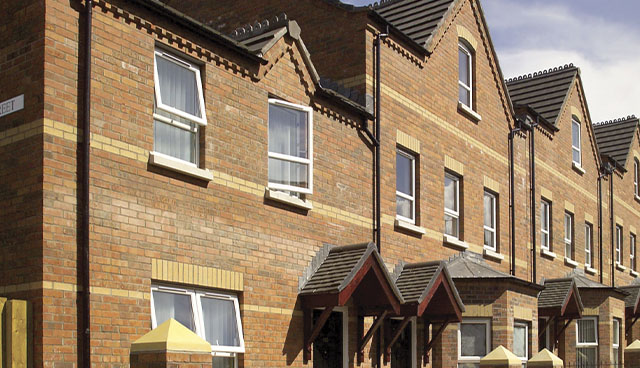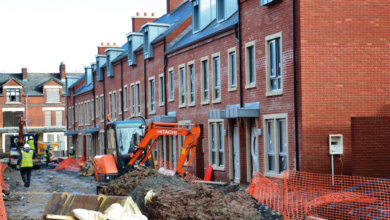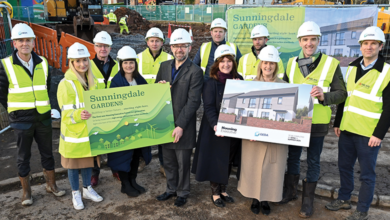A decade of delivery in housing

Chief Executive of the Housing Executive Grainia Long says that a relentless focus on delivery is required, if we are to realise the economic, social, and environmental potential of housing in this decade.
Following on from the 2022 Assembly election and the hope that an Executive can be formed soon, Long says that the Housing Executive will be ready to deliver on a forthcoming Programme for Government (PfG), and hopes it will recognise the centrality of housing for Northern Ireland’s future.
Firstly, the Chief Executive indicates the need for a complete transformation of the current model for preventing and responding to homelessness. Over the past four years, levels of homelessness have soared, and show no signs of slowing. This has led to excessive use of costly forms of temporary accommodation, at the expense of a holistic focus on prevention and tenancy sustainment. With budgets and front line staff over-stretched, for too long homelessness provision has been in emergency mode.
“It is very clear that simply doing what we have always done is not going to bring around the transformative change which is so clearly needed,” explains Long. “As an organisation, and with our partners, we have been giving serious thought to the strategic shifts that are needed. This decade has to be different if we are to reverse the trends.”
To do this, the Housing Executive published its new homelessness strategy 2022-2027 Ending Homelessness Together, with a specific focus on prevention.
Over the past decade, figures show that the waiting list for social housing has risen by around 10,000 to 43,971 in 2021 and a similar rise has occurred for those in housing stress which is currently around 30,288. Understandably the number of allocations over the decade have not only remained low but have fallen, underpinned by only a small rise in the number of new builds. Long strongly agrees that the gap between housing demand and supply is not closing fast enough, however, she points to evidence in recent years of sustained levels of investment in social housing in Northern Ireland when compared with other parts of the UK, and suggests this is a cause for optimism.
Secondly, the Housing Executive has called for government-wide partnerships on retrofit of homes, addressing fuel poverty and adaptation.
Long welcomes the mindset shift in the post-Grenfell tragedy years which has sought a better balance investment between asset management and housing development. In response, the Housing Executive has significantly increased investment in its stock, spending over £195 million in 2021/22 to improve homes and making them fit for the future. Building its capacity for the future, the Housing Executive understands it has a major part to play in ensuring Northern Ireland meets its net zero targets, and warmer dryer homes are essential.
“The decarbonisation challenge is an exciting one,” says Long. “Through improving the energy efficiency of homes we can impact positively on people’s lives, but we need rapid action. The funding and scaling up of implementing energy efficiency measures across Northern Ireland is urgently required across all tenures, not just social housing, and we have a great opportunity to do this on a cross-governmental business.
“We are very proud of what we have collectively delivered in relation to energy efficiency, but we recognise the need to ramp that up in the short to medium-term. This presents a once-in-a-generation opportunity for industry to invest in skills and ensure the right supply chains are in place. The potential to reduce economic inactivity through local apprenticeship schemes could be transformational.
“Fundamentally, the Housing Executive has put sustainability at its core, meaning we want to transform everything we do with an intent and urgency on the need to decarbonise our stock, improve energy efficiency, support the building of low-carbon homes and decarbonise our fleet.”
The third ask of a Programme for Government is revitalisation of the Housing Executive which will allow it to borrow against its assets and invest in its homes and add to new supply.
“If we are going to change the trends around rising homelessness and increasing waiting lists then we must ensure we have sustained levels of funding for social housing. Again, this does not only mean new developments. Our investment levels in our own stock were the highest they have been since 2007 but we are still faced with a huge investment requirement and funding shortfall for this decade and over our 30-year investment plan.
“We are preparing for the point where we can borrow in order to invest and address these challenges. That is one of the game-changers that will allow us to look back on this decade and map out significant improvements.”
Barriers
Long acknowledges that a number of potential barriers exist in delivery of the Housing Executive’s ambitions. Chief among them is the potential absence of a long-term investment plan for its homes. There is also a risk of failure to make the most of partnerships across the housing sector and across government and for the potential opportunities afforded by scaling up energy efficiency and retrofitting in this decade to be missed.
“Transformation and revitalisation are about much more than better housing and better lives for our tenants. Through investment for the future, we can create a huge economic opportunity for young people to join the labour force and for others to skill-up or re-skill. That is why we are developing partnerships across education, industry, and government.
“Additionally, we believe there is much more potential to extract social value from investment in housing, meaning that every £1 spent delivers into the heart of the community.”
Long concludes: “Housing has an economic, environmental, and social mission and we have an opportunity in this decade to deliver significant change. Doing what we have always done will no longer work- a step change is needed if we are to deliver results for the people we serve.”
Housing Executive
T: 03448 920 900
E: information@nihe.gov.uk
W: www.nihe.gov.uk







